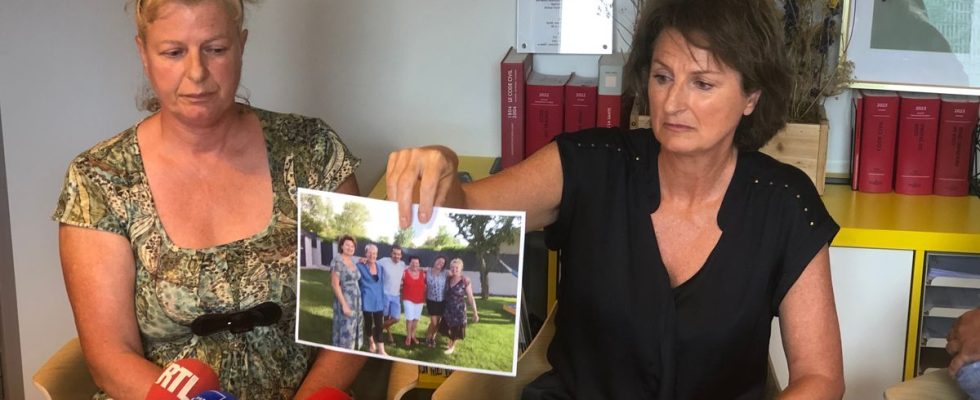“Why did he pick on her?” For more than two years, this question has haunted her. On the eve of the trial of Gabriel Fortin, nicknamed the “DHR killer”, Marie-Hélène Givet is still looking for answers. His sister, Patricia Pasquion, who “devoted her life to others”, died on January 28, 2021. She is one of the three victims murdered by the person concerned at the end of a bloody journey that led him to the Haut-Rhin, Drôme and Ardèche.
It was just before 9 a.m. when the accused entered the premises of the Pôle emploi agency in Valence (Drôme). Wearing a cap and his face partly protected by a surgical mask, he presented himself under a false identity to quickly go to the complaints office. And in an “appalling silence”, he shot in cold blood at the victim, hit in the chest. Patricia was 54 years old.
“What did my sister come to do in this course? Was she really his target? Was she killed for what she stands for? asks Marie-Hélène constantly, whose curly blond hair is tied in a bun. In this case, there is nothing to establish that Fortin, an unemployed engineer for ten years, may have crossed his path in the past, as is the case for the other victims. Patricia, an adviser who managed the compensation and dispute files, was not responsible for monitoring her. Had she received it one day, more than eleven years ago? Again, no documentation indicates this. No trace of any litigation, either.
An “institutional hatred”?
“Is it by chance? “Questions in turn Catherine Ribuot, another sister of the victim. Only here, Gabriel Fortin remains silent on the subject. Not an ounce of explanation given to the investigating judge and the investigators. Not a word blown to psychiatrists for two years. The man remains silent, preferring to ruminate on his frustrations and spread his resentment in his diaries, where he talks about himself in the third person.
“He wrote a lot before taking action. We must understand how this man set up this project matured for years. How did this switch to the passage to the murderous act come about? “, underlines Hervé Gerbi, the lawyer of the three sisters of the victim. And to continue: “Was it a personal hatred towards Patricia Pasquion or was it an institutional hatred? What happened in his head? »
Confessions, the family does not expect much. “I am preparing to have no answers, we will have to make up our minds, breathes Catherine. But we’re not going to beg him. He considers himself superior to others. Imploring him would only reinforce his position. We will not give him that pleasure. “This silence reflects above all a lack of courage, analyzes Marie-Hélène. Either way, he’s been acting like a coward from the start. He came armed in front of a woman to have this omnipotence and he didn’t even give her the possibility of expressing herself. »
A mother “altruistic” and “faithful in friendship”
“You can think of losing someone by accident. But the way Patricia died, it was unthinkable, ”she continues. “Not used to it”, the two sisters are now preparing for the trial in order to be able to look the accused “straight in the eye”. And to “keep in mind” that it is above all a question of doing justice to Patricia, “and not of the Fortin affair or the killer of DHR”. Behind “the Pôle emploi adviser”, there was a “mother, a wife”, an “altruistic” person, they recall.
“She always put others, whether her children or her family, before her,” says Catherine, very moved. She was faithful in friendship. We never heard him complain. She wasn’t used to talking about herself and if she did, it was because it really weighed on her. In recent times, when the family gathered for special occasions, Patricia had nevertheless approached the difficulties at work with a certain modesty. The “incivility” not to say insults or physical attacks. The 50-year-old had already received death threats. For a while, her husband came to pick her up at work especially to prevent a tragedy from happening.
“Pôle emploi knew very well that this was going to happen”
“We knew it was going to happen one day or another and it fell on my sister, laments Catherine. Pôle emploi knew this very well but nothing was done for the safety of the agents. “Faced with this significant problem of resurgence of violence, the employer should have taken security measures, points out in turn Hervé Gerbi. But when Patricia Pasquion died, these measures did not exist. Nothing had been set up at the entrance to the agency. If a security guard had been posted, Gabriel Fortin would not have been able to get in so easily with his revolver barely concealed in a plastic bag. »
If the two sisters plan to file a complaint against Pôle emploi for manslaughter, the state agency will find itself in this file on the bench of the civil parties. As for the accused, he risks life imprisonment. “I hope he will receive at least an incompressible sentence of thirty years. This will not repair all the suffering but we do not want him to be able to come out of prison one day, ”concludes Marie-Hélène, supported by her sister.

